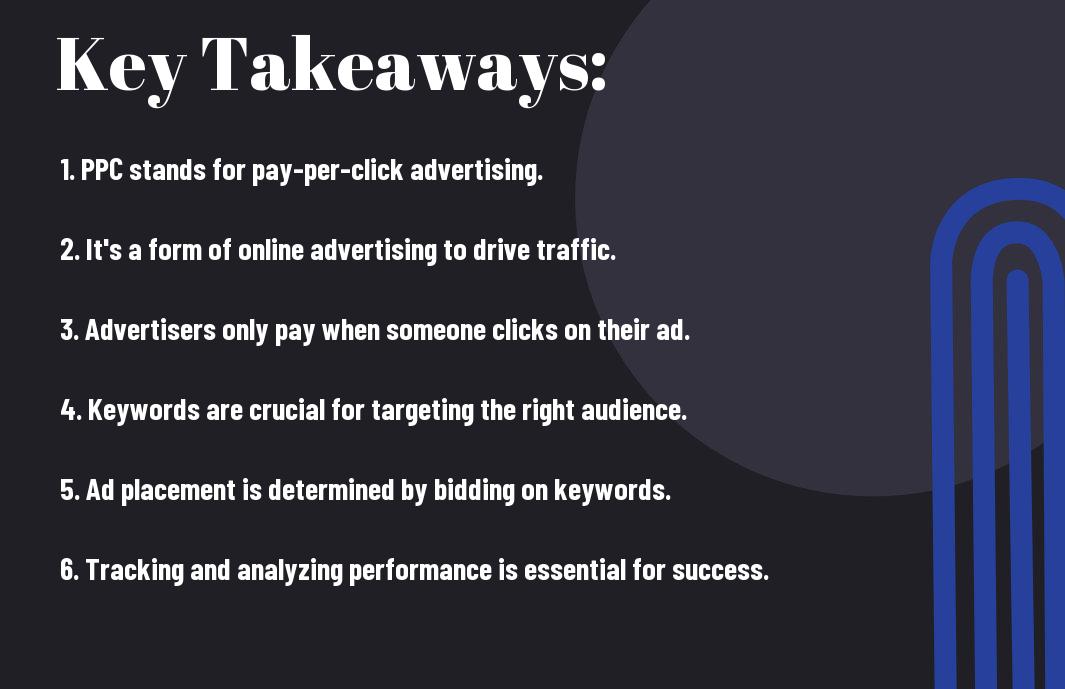You may have heard about PPC advertising, but do you really understand the fundamentals of this powerful digital marketing tool? Pay-per-click (PPC) advertising is a crucial component of any successful online marketing strategy, allowing you to target your audience with precision and achieve immediate results. In this blog post, we will break down the key concepts of PPC advertising, from selecting the right keywords to creating compelling ad copy, so that you can harness the power of PPC to drive qualified traffic to your website and maximize your marketing ROI.
Key Takeaways:
- PPC advertising can be a powerful tool for driving targeted traffic to your website.
- Understanding keyword research and targeting is crucial for PPC success.
- Effective PPC campaigns require continuous monitoring and optimization.
- PPC advertising can provide valuable insights into consumer behavior and preferences.
- Utilizing landing pages and call-to-action elements is essential for converting PPC traffic into leads or sales.

Core Components of PPC Advertising
Assuming you are new to PPC advertising, it’s crucial to understand the core components that make up a successful PPC campaign. These components include keyword relevance and research, ad copy and creative strategies, landing page optimization, and bid management. By mastering these core components, you can effectively reach your target audience and drive valuable conversions.
Keyword Relevance and Research
When it comes to PPC advertising, keyword relevance and research are essential for driving the right traffic to your website. You must ensure that your chosen keywords are highly relevant to your business and the products or services you offer. Conducting thorough keyword research will help you identify the most effective keywords for your campaign, as well as discover new opportunities for reaching potential customers. By understanding the language and search behavior of your target audience, you can optimize your keyword selection to maximize the success of your PPC ads.
Ad Copy and Creative Strategies
Creating compelling ad copy and creative strategies is key to capturing the attention of your target audience and enticing them to click on your ads. Your ad copy should be concise, engaging, and tailored to the specific needs and interests of your audience. It’s important to highlight the unique selling points of your products or services and include a clear call-to-action to encourage clicks. Additionally, experimenting with different ad formats, visuals, and ad extensions can help you discover which creative strategies resonate best with your audience.
Setting Up a PPC Campaign
Despite the complexity of pay-per-click (PPC) advertising, setting up a PPC campaign is an essential step in reaching your target audience and achieving your marketing goals. Before diving in, make sure you understand the basics of PPC advertising. You can learn more about it here.
Choosing the Right Platforms
When setting up a PPC campaign, it’s crucial to choose the right platforms to reach your target audience. Google Ads and Bing Ads are popular choices, but each platform has its own strengths and weaknesses. You must consider where your audience spends their time and which platforms will give you the best return on investment for your specific business. Make sure to thoroughly research and understand the audience demographics and user behavior on each platform before making your decision. Choosing the right platform can have a significant impact on the success of your PPC campaign.
Budgeting and Bidding Techniques
Another important aspect of setting up a PPC campaign is budgeting and bidding techniques. You need to determine your budget based on your advertising goals and the competitiveness of your industry. Once you have set your budget, you will need to decide on bidding techniques such as manual bidding or automated bidding strategies. Proper budgeting and bidding techniques are crucial for achieving a positive return on your advertising investment.
Optimization and Management
Now that you have set up your PPC campaigns, it’s crucial to optimize and manage them effectively. This involves continuously monitoring and refining your campaigns to ensure they are delivering the best possible results. To help you with this, you can refer to PPC 101: A Complete Guide to PPC Marketing Basics for more detailed insights.
Tracking and Analyzing Performance
Once your PPC campaigns are live, you need to track and analyze their performance regularly. This involves monitoring key metrics such as click-through rates, conversion rates, and cost per conversion. By analyzing this data, you can identify which keywords, ad copy, and targeting settings are delivering the best results. This information allows you to make informed decisions about where to allocate your budget for maximum impact.
Ongoing Campaign Adjustments
As you track and analyze your PPC campaign performance, you’ll need to make ongoing adjustments to optimize your results. This may involve tweaking your ad copy, refining your keyword targeting, or adjusting your bidding strategy. By continuously optimizing your campaigns, you can improve your return on investment and drive better results for your business.

Advanced PPC Strategies
Your understanding of PPC advertising has grown, and now it’s time to explore some advanced strategies to take your campaigns to the next level. Here are some key strategies to consider:
- The Ultimate Guide to PPC Marketing (Pay-Per-Click)
- Utilize dynamic keyword insertion for ad personalization
- Implement A/B testing for ad copy and landing pages
- Use ad extensions to provide additional information and increase visibility
Utilizing Remarketing Tools
Remarketing allows you to target users who have previously visited your website but didn’t take the desired action. By placing a tracking pixel on your site, you can show ads to these visitors as they browse other websites. This can be a powerful way to re-engage with potential customers and encourage them to return to your site and complete a purchase.
Leveraging Audience Targeting
Understanding your target audience is essential for maximizing the effectiveness of your PPC campaigns. Leveraging audience targeting allows you to show your ads to specific demographics, interests, and behaviors. By tailoring your messaging to the individuals most likely to be interested in your product or service, you can improve your click-through rate and conversion rate.
Understanding the Basics of PPC Advertising
Presently, you should have a solid understanding of the basics of PPC advertising. You now recognize the importance of keyword research, ad relevance, and landing page optimization in creating successful PPC campaigns. Additionally, you understand the auction-based nature of PPC advertising and the factors that affect ad placement and cost. Moving forward, you can apply these fundamentals to create effective PPC campaigns that drive traffic and conversions for your business.
FAQ
Q: What is PPC advertising?
A: PPC stands for pay-per-click, a form of online advertising where advertisers pay a fee each time their ad is clicked. It’s a way of buying visits to your site rather than attempting to earn those visits organically.
Q: How does PPC advertising work?
A: In PPC advertising, advertisers bid on keywords that are relevant to their target audience. When users search for those keywords, the ads are displayed. Advertisers only pay when their ad is clicked, making it a cost-effective way of reaching potential customers.
Q: What are the benefits of using PPC advertising?
A: PPC advertising offers quick results, precise targeting, and the ability to track and measure the success of your campaigns. It also allows for budget control and the ability to reach a larger audience that may not be reached through organic search.
Q: How can I optimize my PPC advertising campaigns?
A: To optimize your PPC campaigns, it’s important to conduct keyword research, create compelling ad copy, use relevant landing pages, and continuously monitor and adjust your campaigns based on performance data. It’s also crucial to test different elements of your ads to see what resonates best with your audience.
Q: What are common mistakes to avoid in PPC advertising?
A: Common mistakes in PPC advertising include not doing thorough keyword research, not having clear goals and metrics for success, not testing different ad copy and landing pages, and not regularly monitoring and adjusting your campaigns. It’s also important to set realistic budgets and manage them effectively to avoid overspending.
